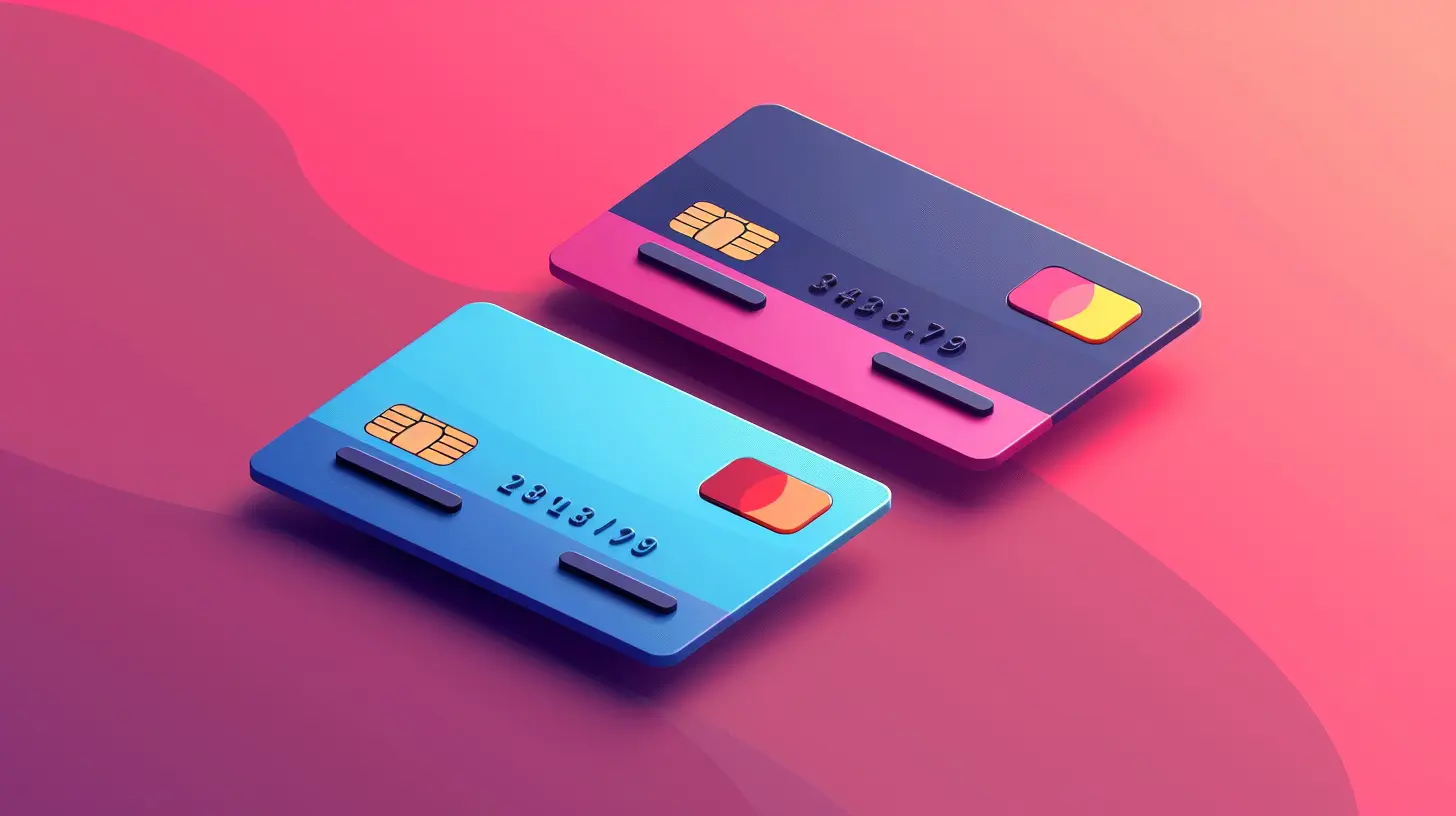Understanding Charge Cards vs Credit Cards: Key Differences
13 December 2024
When it comes to managing your finances, knowing the tools in your wallet is absolutely essential. Two common contenders that often confuse people are charge cards and credit cards. If you ever caught yourself scratching your head, wondering if they’re basically the same or if one’s more ‘fancy’ than the other, you’re not alone. Let’s dive into the world of these two plastic powerhouses and understand the key differences between them.

What Are Charge Cards and Credit Cards?
Before we start comparing apples to apples, let’s define what we’re dealing with here.Credit Cards: A Flexible Friend with Limits
Most of us are familiar with credit cards, right? They’re those swipe-worthy tools that let you borrow money up to a set limit determined by your issuer. You can make purchases, pay bills, or even withdraw cash (hello, cash advances—but careful, they come with higher fees).The beauty of credit cards is their pay-it-back-at-your-pace vibe, as long as you pony up at least the minimum payment by the due date. However, interest charges start adding up quickly if you’re rolling over unpaid balances.
Charge Cards: No Limits (But Strings Attached)
Charge cards, on the other hand, are rarer these days. They don’t come with a pre-set spending limit, which might sound like hitting the no-limit jackpot. But here’s the kicker—you’re required to pay your balance in full every month. So, no “minimum payment” safety net here!Picture this: a charge card is like borrowing from a friend who trusts you a lot but wants every penny back by payday.
Got the gist? Now, let’s break down their key differences. 
The Key Differences Between Charge Cards and Credit Cards
1. Spending Limit
This one’s a major distinction.- Credit Cards: They come with a set credit limit. If your limit is $5,000, then that’s the ceiling for your spending. Overstepping it? You might face over-limit fees (if your issuer allows it) or have your transaction declined.
- Charge Cards: No pre-set spending limit. Instead, your spending power is determined by factors like your income, payment history, and spending habits. But don’t get carried away—you still need to pay the full amount by the next billing cycle.
In essence, a credit card gives you boundaries, like training wheels, whereas a charge card trusts you to know your limits.
2. Payment Requirements
Here’s where things get tricky.- Credit Cards: These are flexible. You can carry a balance if you’d like, paying it off over time. Just ensure you make at least the minimum payment, or you’ll find yourself in penalty territory—and don’t forget about interest rates!
- Charge Cards: No flexibility whatsoever. You’re expected to clear your entire statement balance every month. Miss it? Be prepared for steep late fees or restrictions on your account.
Think of it this way: If a credit card is like a pay-what-you-can buffet, a charge card is a strict à la carte menu—you pay for everything you order, no exceptions.
3. Interest Rates
This is a biggie, especially for those who like to keep their options open.- Credit Cards: Interest rates, usually referred to as APR (Annual Percentage Rate), kick in if you carry a balance. Some cards even offer promotional 0% APR for new purchases or balance transfers for a limited time, but eventually, interest applies.
- Charge Cards: Since you can’t carry a balance, there’s no such thing as an APR for most charge cards. No balance, no interest—it’s that simple.
If you’re someone who’s disciplined about paying off your balance, a charge card might be appealing. If not, stick with a credit card and be mindful of interest.
4. Fees
Let’s talk about the cost of holding these cards.- Credit Cards: Most offer a variety of options—there are no-annual-fee cards, mid-tier options with modest fees, and premium cards that can run you a few hundred bucks a year. Fees are often justified by rewards, perks, or cashback programs.
- Charge Cards: Prepare to fork over a yearly fee, no matter what. And we’re not talking small change—most charge cards come with hefty annual fees because they’re typically marketed to high-spenders or those who value premium perks.
Is paying more worth it? That depends on how much you value the card’s benefits.
5. Rewards and Perks
Ah, the fun stuff!- Credit Cards: With hundreds of cards on the market, you can bet there’s one for everyone—whether you want cashback, travel miles, or bonus points for dining, groceries, or gas. Plus, many credit cards offer additional perks, like purchase protection, extended warranties, and access to exclusive events.
- Charge Cards: These often come with high-end, luxury-level perks. Think access to airport lounges, travel credits, elite hotel statuses, and concierge services. The rewards are generally geared toward big spenders.
In short, credit cards cater to everyday earners and spenders, while charge cards aim to wow high rollers.
6. Availability
Let’s get real—charge cards are kinda like unicorns in the financial world.- Credit Cards: Available everywhere. Whether you’re a student, a seasoned professional, or rebuilding your credit, there’s a card for you.
- Charge Cards: A lot rarer. American Express is one of the few major issuers still offering charge cards. And even then, they’re not for everyone—they typically require excellent credit and a higher income.
So, while almost anyone can find a credit card that fits their needs, a charge card feels more exclusive. 
Pros and Cons of Each Card
Now that we’ve covered the nitty-gritty details, let’s weigh the pros and cons of each.Credit Cards: The All-Rounder
Pros:- Wide range of options for all income levels
- Flexible payment terms
- Lower or no annual fees (depending on the card)
- Tons of reward programs and perks
Cons:
- Easy to overspend if you’re undisciplined
- Interest charges can pile up
- Some cards have high fees for premium benefits
Charge Cards: The Premium Pick
Pros:- No pre-set spending limit
- Luxury-level rewards and perks
- No interest charges since balances are paid in full
Cons:
- Mandatory full payment every month
- High annual fees
- Limited availability and exclusivity 
Which Card Should You Choose?
Now comes the million-dollar question: which card is better for you? Well, it depends on your financial habits, spending patterns, and goals.- Go for a Credit Card if: You need flexibility with payments, want a variety of reward programs, and prefer an option accessible to different income levels.
- Opt for a Charge Card if: You can commit to paying off your balance monthly, value luxury perks, and don’t mind paying a high annual fee for premium benefits.
Think of it this way: are you looking for the financial freedom of a credit card or the prestige and discipline of a charge card?
Final Thoughts
Both charge cards and credit cards can be effective tools in your financial arsenal, but they cater to different lifestyles and spending preferences. Credit cards are the everyman’s tool—accessible, flexible, and versatile. Charge cards, on the other hand, are like the Ferrari of payment methods—they require discipline, financial stability, and a taste for exclusivity.By understanding the key differences, you’ll be better equipped to decide which one deserves that coveted spot in your wallet.
all images in this post were generated using AI tools
Category:
Credit CardsAuthor:

Harlan Wallace
Discussion
rate this article
17 comments
Sylph Benton
Charge cards and credit cards serve distinct purposes in personal finance. Charge cards promote discipline with mandatory full payments, while credit cards offer flexibility with revolving debt. Understanding these differences can enhance financial management and align spending habits with individual financial goals.
February 13, 2025 at 8:52 PM

Harlan Wallace
Thank you for your insightful comment! You're absolutely right—recognizing the distinct purposes of charge cards and credit cards is essential for effective personal finance management.
Elijah McGuire
In the world of personal finance, charge cards and credit cards may seem interchangeable, yet their subtle differences can lead to unexpected consequences. Unraveling these intricacies could be the key to unlocking smarter spending and avoiding financial pitfalls. What hidden truths lie within your wallet?
February 3, 2025 at 11:33 AM

Harlan Wallace
Thank you for highlighting the importance of understanding these differences! Knowing how charge cards and credit cards work can significantly impact our financial health and spending habits.
Ingrid McVicar
Great insights on charge vs credit!
January 30, 2025 at 4:08 AM

Harlan Wallace
Thank you! I'm glad you found the insights helpful!
Astra McNaughton
Empowering yourself with knowledge about charge cards and credit cards is a crucial step towards financial success. Understanding their differences can help you make informed choices and achieve your goals!
January 26, 2025 at 4:07 AM

Harlan Wallace
Absolutely! Knowledge is key to making informed financial decisions. Understanding the differences between charge cards and credit cards can significantly enhance your financial success. Thank you for your insightful comment!
Ulysses Chavez
This article does a fantastic job of breaking down the nuances between charge cards and credit cards! It’s so helpful to understand their unique features and benefits, especially for those looking to make informed financial decisions. Thank you for the clarity!
January 22, 2025 at 12:30 PM

Harlan Wallace
Thank you for your kind words! I'm glad you found the article helpful in clarifying the differences between charge cards and credit cards.
Yasmine Pruitt
Ah, the age-old debate of charge cards vs. credit cards—because who doesn’t love a little financial jargon? It’s like choosing between a cherry on top and a sprout in your salad. So thrilling!
January 17, 2025 at 8:53 PM

Harlan Wallace
I appreciate your humor! While charge cards and credit cards may seem like financial jargon, understanding their differences can significantly impact your spending habits and financial health.
Kassidy Vasquez
Great article! It’s so important to know the differences between charge cards and credit cards. This guide makes it easy to understand their unique benefits!
January 11, 2025 at 5:17 AM

Harlan Wallace
Thank you for your kind words! I'm glad you found the guide helpful in understanding the differences.
Delilah McClendon
Understanding the distinctions between charge cards and credit cards is essential for making informed financial decisions and managing spending wisely.
January 3, 2025 at 8:52 PM

Harlan Wallace
Absolutely! Recognizing the key differences between charge cards and credit cards can empower better financial choices and effective spending management.
Pamela Reyes
What a delightful read! 😊 Understanding the differences between charge cards and credit cards is essential for smart financial decisions. This article breaks it down beautifully, making it easy for everyone to grasp their options. Cheers to smarter spending! 💳✨
December 30, 2024 at 7:55 PM

Harlan Wallace
Thank you so much for your kind words! I'm glad you found the article helpful in clarifying the differences. Cheers to smart financial choices! 😊💳✨
Valeris Mercado
Charge cards offer unique benefits; know their power versus credit cards!
December 27, 2024 at 9:21 PM

Harlan Wallace
Thank you for your insight! Charge cards do indeed provide distinct advantages, such as higher spending limits and no interest charges, but they also require full payment each month. Understanding these differences is crucial for making informed financial choices.
Tiffany Perez
This article effectively clarifies the distinctions between charge cards and credit cards. Understanding these differences is crucial for making informed financial decisions and choosing the right option for personal spending habits. Great insights!
December 20, 2024 at 5:28 AM

Harlan Wallace
Thank you for your feedback! I'm glad you found the distinctions helpful for your financial decisions.
Rhiannon Peterson
Charge cards offer flexibility without limits; credit cards provide revolving credit options.
December 15, 2024 at 9:46 PM

Harlan Wallace
Thank you for your comment! You've captured the essence of the differences well: charge cards emphasize flexibility and require full payment, while credit cards allow for revolving credit with interest.
Bryce Sullivan
Thank you for clarifying these differences! This guide is invaluable for making informed financial decisions. Truly appreciate your insights!
December 14, 2024 at 2:02 PM

Harlan Wallace
Thank you for your kind words! I'm glad you found the guide helpful for your financial decisions.
Jocelyn McVicker
Charge cards offer no preset spending limit but require full repayment monthly, while credit cards allow for revolving balances and interest.
December 14, 2024 at 3:50 AM

Harlan Wallace
Thank you for your succinct summary! You've highlighted the fundamental distinctions between charge cards and credit cards perfectly.
Heath McKinney
Great article! You’ve clearly outlined the key differences between charge cards and credit cards, making it easy to understand their unique benefits. This information is invaluable for anyone looking to make informed financial decisions. Keep up the good work!
December 13, 2024 at 9:18 PM

Harlan Wallace
Thank you so much for your kind words! I'm glad you found the article helpful.
Tessa Clark
Great breakdown of charge cards vs. credit cards! Understanding these key differences can really empower our financial decisions. Whether you're looking to simplify spending or rack up rewards, you've got this! Keep shining in your financial journey! 🌟
December 13, 2024 at 1:34 PM

Harlan Wallace
Thank you! I'm glad you found it helpful. Understanding these differences truly can enhance our financial choices. Keep striving for financial wellness! 🌟
Henrietta McGinnis
Charge cards empower; credit cards enable.
December 13, 2024 at 4:10 AM

Harlan Wallace
Thank you for your insight! Indeed, charge cards promote responsible spending by requiring full payment, while credit cards offer flexibility with revolving balances. Both serve unique purposes in personal finance.
MORE POSTS

Uncovering Hidden Fees That Are Silently Draining Your Wallet

Understanding Required Minimum Distributions (RMDs)

How to Rebuild Your Credit Score with a Secured Credit Card

Speculative Investing and the Art of Timing

Understanding the Five-Year Rule for Roth IRAs

Why You May Need Insurance Even If You’re Self-Employed

The Importance of Paying Yourself First for Sustainable Wealth

How Backdoor Roth IRAs Benefit High-Income Individuals

Retirement Planning 101: How to Ensure a Comfortable Future

Strategies for Deferring Capital Gains Taxes

High Inflation Survival Guide for Families and Households